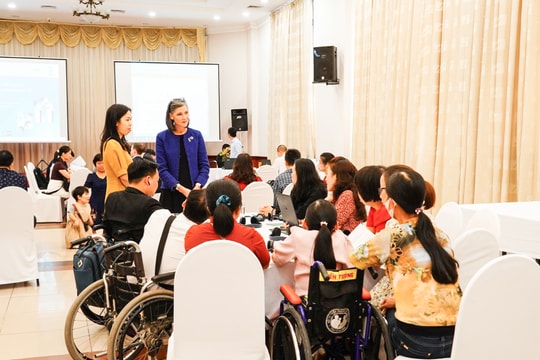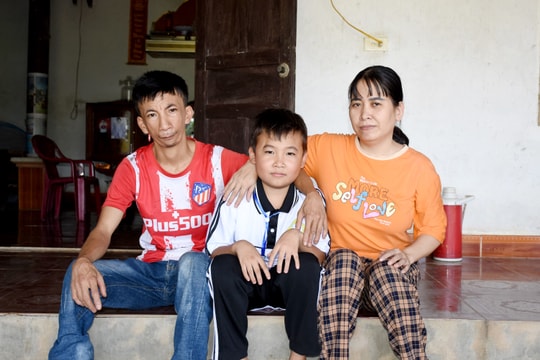Lighting up the faith of people with disabilities
(Baonghean.vn) - On the occasion of International Day of Persons with Disabilities (December 3), Nghe An Newspaper had an interview with Ms. Bui Thi Lai - who has been working with disabled students for more than 30 years at the Center for Education and Vocational Training for the Disabled in Nghe An province.
Reporter: It is known that at the Provincial Center for Education and Vocational Training for the Disabled, you are one of the teachers who have been working the longest in caring for and teaching disabled students. So can you share about your working process at the Center?
Teacher Bui Thi Lai:I was born in 1972 in Duc Tung commune (now Tung Chau commune) of Duc Tho district, Ha Tinh province. My father was an officer at the Center for Vocational Education for the Disabled in Nghe Tinh province (nowNghe An Province Center for Education and Vocational Training for the Disabled), and my mother was a secondary school teacher. When I was over 3 years old, my mother passed away, so my family's situation was very difficult. Therefore, in 1990, after graduating from high school, I was accepted to work at my father's agency (Center for Vocational Education for the Disabled) as a service staff, taking care of disabled students.
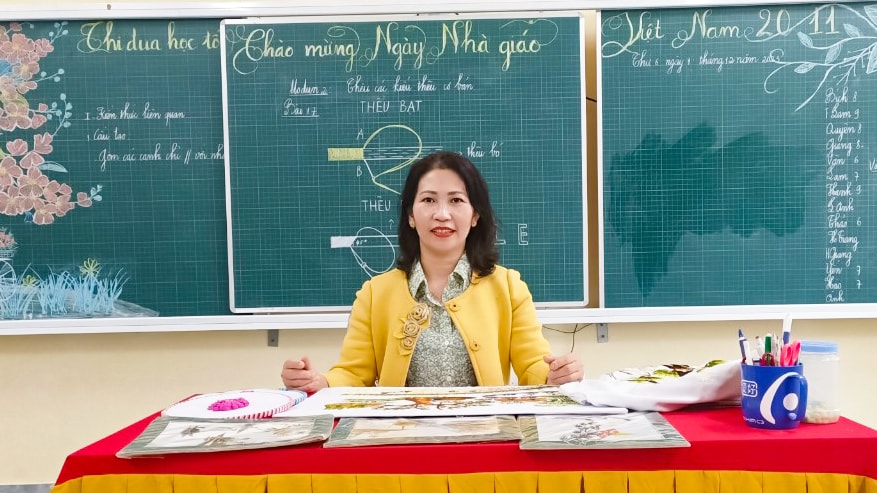
During my work, I had the opportunity to meet the teachers of the center, especially the teachers of the Vietnam Institute of Educational Sciences, and was encouraged by them to pursue a career in teaching culture to disabled students. After more than 1 year at the center, I was assigned to teach, while working, I also learned knowledge and experience from previous teachers as well as experts in education for disabled children.
The more I interacted with special students, the more I wanted to stick with the job of a teacher of disabled students for a long time, and then determined that it was my "career". Since it was a career, I had to standardize my qualifications and improve my professional and technical skills, so in 1996, I asked for permission from my unit to study for a bachelor's degree in Primary Education at Vinh University. After graduating from the course, I continued to teach culture at the Provincial Vocational Training Center for the Disabled.
In 2007, in response to the unit's request to strengthen vocational training for students, I switched to teaching embroidery until now. Before that, I also went through a vocational training course for disabled students and completed the course with an excellent certificate. So far, I have had more than 33 years of experience working with disabled students, including nearly 16 years of teaching culture and 16 years of vocational training for them.
Reporter: As you said, students at the Provincial Center for Education and Vocational Training for the Disabled are special students. So can you tell us what are the characteristics of teaching culture and vocational training to disabled students, and what special skills do teachers at the Center need?
Teacher Bui Thi Lai:At the Provincial Center for Education and Vocational Training for the Disabled, our staff and teachers are responsible for teaching culture, vocational training, career guidance and job creation for the disabled; coordinating consultation, early intervention and rehabilitation for children with intellectual disabilities and autism; organizing boarding and semi-boarding for students when they study at the Center.
When I first started working at the center, each year the center received about a few dozen disabled students. After 30 years, the scale and tasks of the center have been upgraded to meet social needs, so in recent years the center has received 100-150 students each year. Most of them are from poor households; if they stay at home with their families, they will face many difficulties in studying and integrating into society. But when they come here, they can study culture, learn a trade, and learn independent skills to take control of their lives.
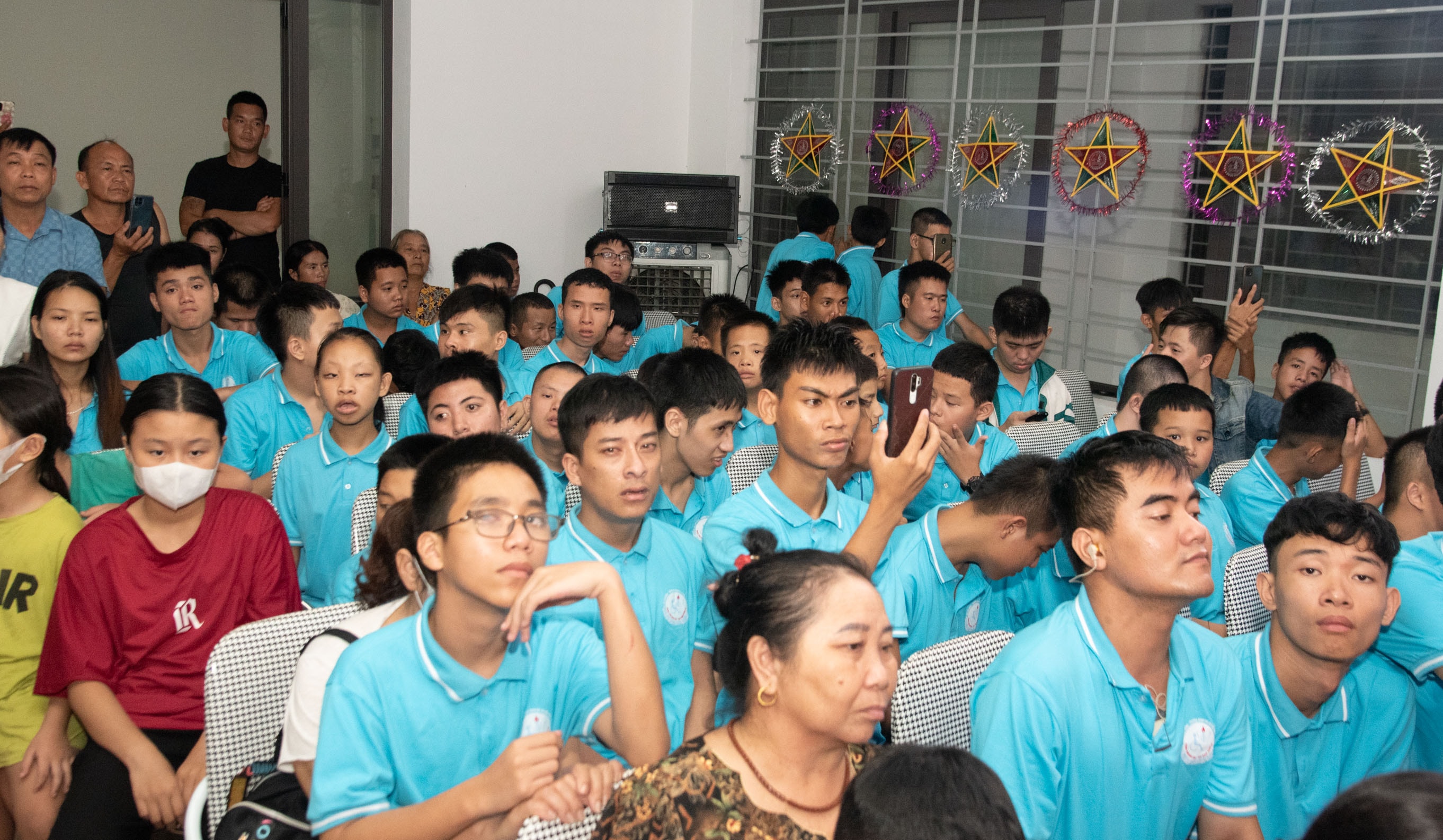
There are many special things to say about the students at the Center. During my work, I have come into contact with students with many different types of disabilities, from visual impairment, hearing impairment (mute, deaf) to motor impairment, intellectual disability. Due to the characteristics of each type of disability, the level of impairment, the needs and learning ability of each disabled student are also different, but the common point is that they all have much more difficulty than normal people in studying culture and vocational training.
Teaching a normal student is difficult, teaching a disabled student is many times more difficult. In a class for disabled students, whether in the cultural or vocational block, the students have different ages of entry, different types of disabilities, different levels of disabilities and uneven psychological development.
Therefore, when taking on a class, teachers must have a firm grasp of the students' medical conditions and skills in order to use effective educational methods. Before becoming a teacher, one must be a friend, create a friendly and close atmosphere so that the students can be bolder, more confident in integrating and playing with the group. To do that, teachers need to be patient, not impatient, and have sympathy and sharing...
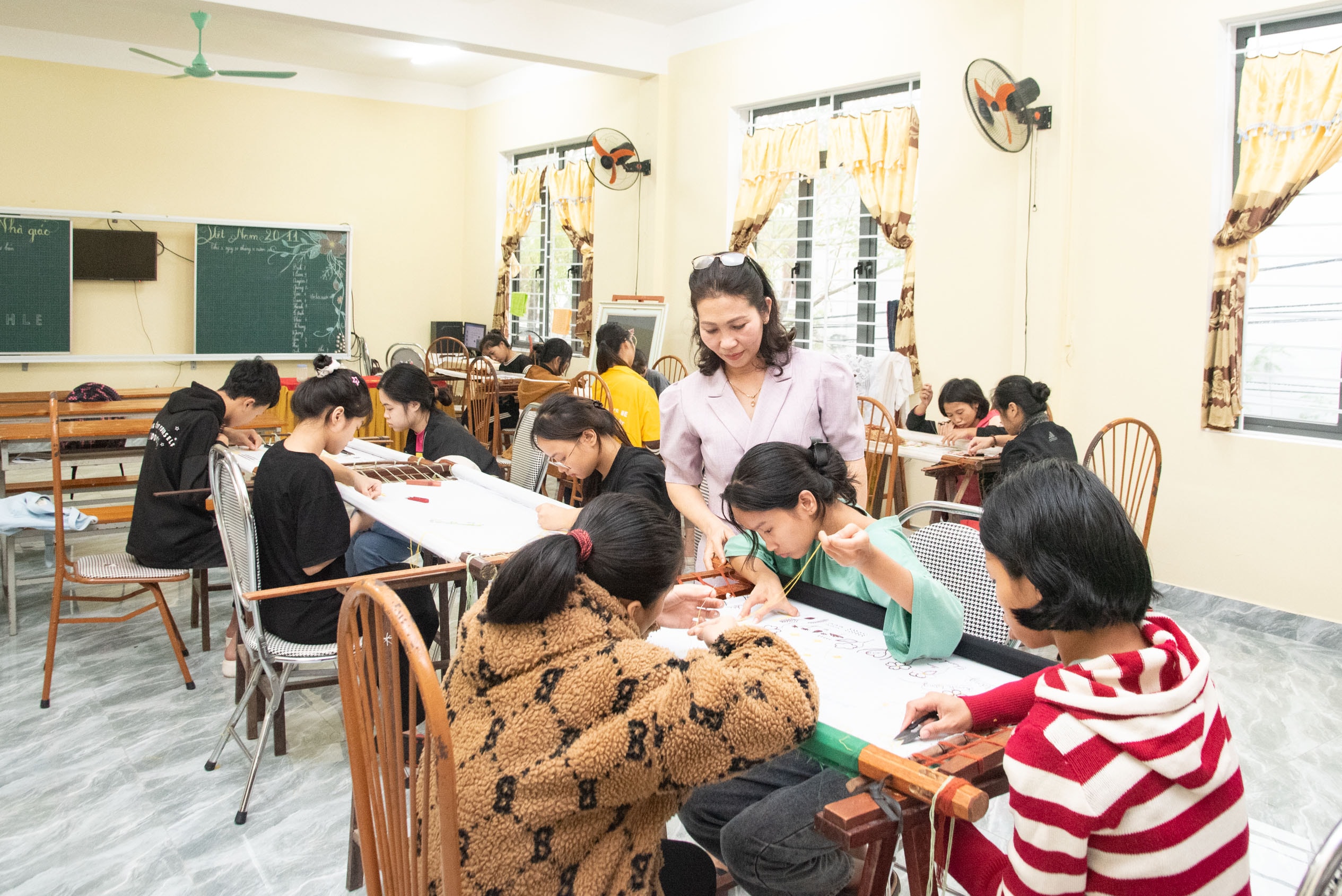
It can be said that, although I have gone through some courses on special education, although I have been regularly trained in cultural and vocational teaching for people with disabilities, the reality shows that teaching a student with disabilities is much more difficult than what I was trained for. Even in the early years, I felt inferior because I was a teacher of people with disabilities. But if teachers are discouraged, their families will also give up and their future will be bleak.
With that in mind, the teachers and I at the center encourage each other to strive to overcome difficulties, inspire and love the students through our lectures, through every action and gesture to guide the students every day, helping them to overcome their inferiority complex.
PV: As someone who has been involved in vocational training for the disabled for many years, you must have had many happy and sad memories. Can you share some memorable memories and stories during your work?
Teacher Bui Thi Lai:After more than 30 years of working, I have many memories with disabled students. Like the first time I started teaching culture, my students were mainly blind students. People say "rich eyes, poor hands", for blind students, their life is very difficult and disadvantaged. When they first entered the center, all the steps of eating and living of the students needed the help of teachers. But in return, they could hear and speak so communication was also convenient, many of them had smart thinking and were also very emotional.
In the past, the teachers of the Center did not only teach one session like now, but also taught in the morning, fed the students at noon, and in the evening they had to go to class to do activities with the students. In general, being a teacher, a mother, a sister, and a friend was very hard, but the closer we were to the students, listening to their sharing, witnessing them becoming more and more confident in life with the knowledge and skills they had learned, the more we loved, felt, and felt all the hardships were gone.
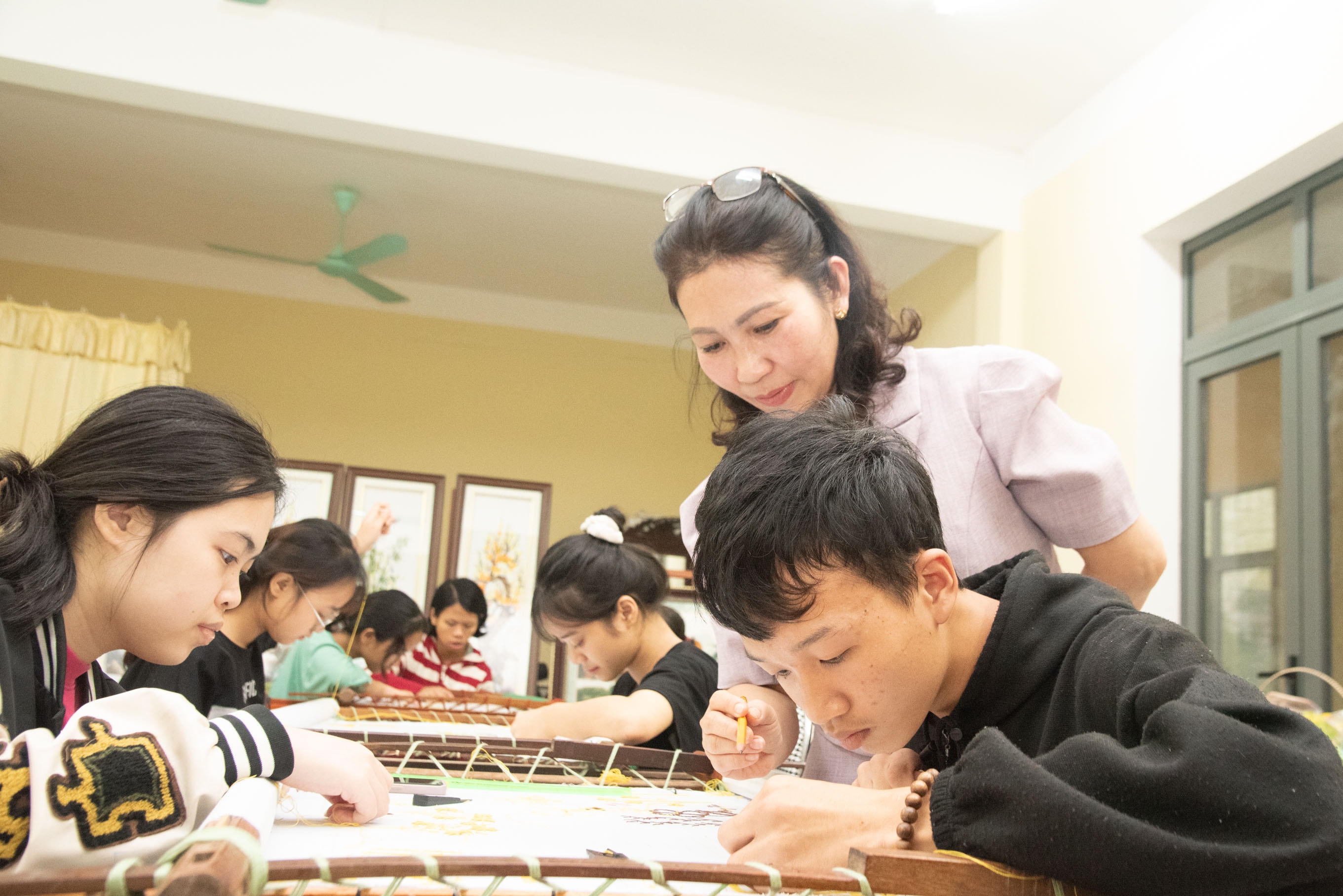
Many of my first students have now been able to earn a living, many of them have a place in society such as Phan Thi Hoa - Former President of the Vinh City Blind Association; Phan Thi Thuong Hoai, currently President of the Tan Ky District Blind Association... Although I only taught them in the first years of primary school, until today they still consider me as a relative, still come to share stories in life. Many of them have jobs, and on family building days they even invite me to attend.
Over time, with the development of society and health care, the number of blind students coming to the center has decreased, but the number of hearing impaired, mobility impaired, and especially intellectually disabled students has increased. Compared to the blind students in the 1990s, these students have less difficult family circumstances, and many of them even come from well-off families.
However, I still remember the case of Ban, a mentally disabled child in Truong Thi ward, Vinh city. His family was very poor, he was an only child, his parents were both old and in poor health. After a period of not being able to integrate into the general school, his parents sent him to the Center. Despite his mental disability, he was very determined, cycling more than 5 kilometers from home to the center every day, and was also very individualistic.
For students like Ban, in addition to constantly talking and encouraging them to absorb knowledge in Vietnamese and Math, I also have to apply real-life situations such as acting out a shopping trip, and then using vivid visual images and objects. Thanks to that, by the end of the cultural course, he was able to write simple sentences and calculate within a limited scope. After that, he was able to earn a living by selling soft drinks.
Later, when I switched to teaching a profession, I realized that there were many children who, despite having disabilities in their hands and feet, learned embroidery lessons very quickly and after a short time were able to create beautiful products. Each day that passed, from the time the children could hold a needle and embroider clumsily, to when their skills were confirmed and their handmade products became more and more beautiful, I loved and was proud of the path I had chosen even more.
PV: On the occasion of International Day of Persons with Disabilities, can you share your concerns about teaching culture and vocational training to people with disabilities?
Teacher Bui Thi Lai:During my time working at the Center for Education and Vocational Training for the Disabled in Nghe An province, I have seen that cultural and vocational training activities and job creation for the disabled are increasingly receiving attention and support from all levels, sectors, social organizations and philanthropists.
However, most of the students who come here are severely disabled, with many different types of disabilities. Their families live far away, and their circumstances are very difficult, so they have little opportunity to cooperate with the Center in caring for and educating their children. In addition, the Center's facilities and vocational training equipment are still lacking, and the province's resources for vocational training for the disabled are very low compared to the requirements.
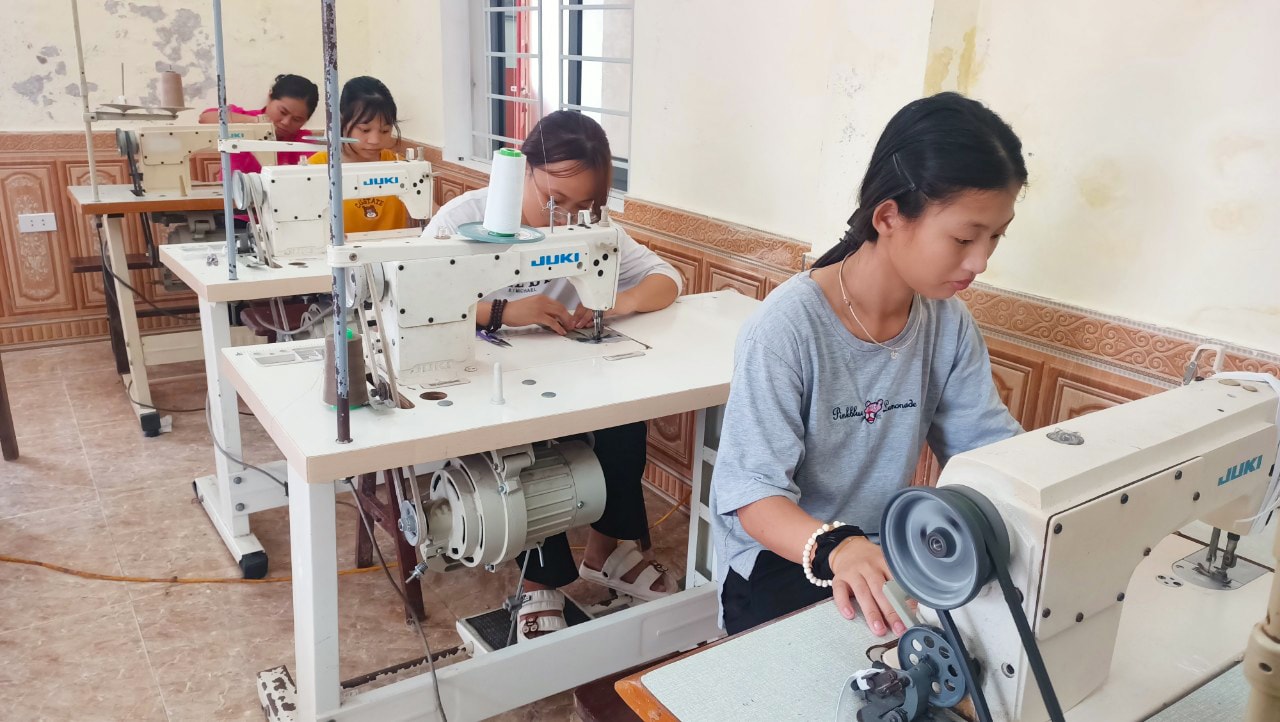
On the other hand, for vocational training for people with disabilities, there is currently no legal document regulating the vocational training framework program, vocational training time, and vocational training materials for people with disabilities. In addition, there is currently no synchronous policy on consulting and supporting employment for people with disabilities, leading to many difficulties in accessing vocational training opportunities and finding jobs for people with disabilities.
Therefore, it is necessary to have more attention from all levels, sectors and the social community in caring for and supporting people with disabilities to light the flame of faith for people with disabilities, help them rise up in life and become useful people for society.
PV: Thank you for the conversation!

